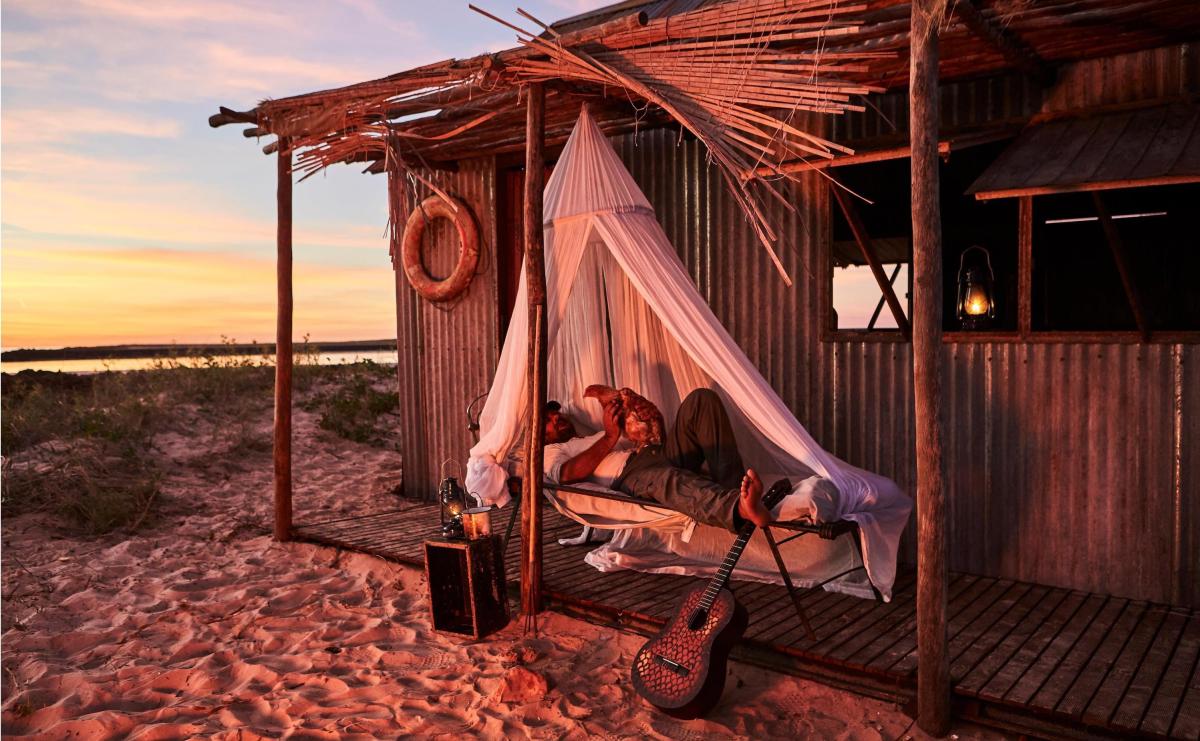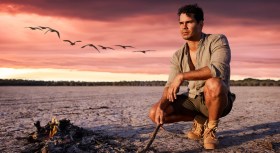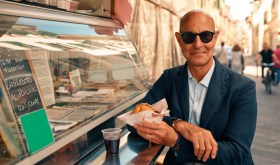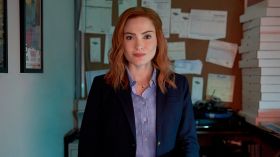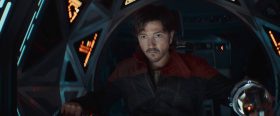When Warwick Thornton kicks off his cowboy boots and hangs up his iconic black jack on the wall of a tin beach shack, it’s an act of symbolic divestment. This is the start of The Beach, a new 6-part SBS/NITV series in which the world-renowned Indigenous filmmaker retreats to a remote hidey-hole on the Dampier Peninsula in north Western Australia without electricity, entertainment or booze. Over many weeks, he walks the beach, or drives in circles in his ancient bull-catcher jeep. He hunts for mud-crabs and fishes, cooks spectacular dishes for one, and occasionally talks to the three chickens he’s brought along for eggs. Mostly he’s silent though, and not very happy-looking. Beardy and bedraggled, he’s out of shape in his rusty black t-shirt. Sometimes he throws his guitar out the door.
Not much happens, and yet it does.
The Beach is a very understated rehab story. It’s framed as a search for redemption; Thornton’s attempt to ‘transform and heal his life’. He says nothing so overt in the actual series. Any transformation seems subtle. Minimalist to the point of dreamy, the show is the opposite of reality TV or your average cooking series. Recipes are prepared without narration or instruction, but with great care and always photogenically. Thornton is renowned as a passionate chef who cooks for crews to recover from hectic days on film sets, but here he’s cooking for one and sometimes seems lost. The basic one-room shack has a rustic kitchen table stocked with some very good basics (including dried porcini mushrooms and palm sugar, which he shaves and cuts into lines at one point, before joking that he doesn’t know what he’s doing). He must catch the protein to make the centrepiece of each day, and its often frustrating.
Created and directed by Thornton, and shot (magnificently) by his son Dylan River, The Beach is a highly crafted piece of slow television to be viewed as a single three-hour event or in 6 half-hour slots. It’s all about solitude, albeit the solitude of a small crew, including River on cameras, sound recordist Nicole Lazaroff and producers Michelle Parker, Tanith Glynn-Maloney and Mitchell Stanley. The credits include art director Herbert Pinter, and a score by Megan Washington.
Thornton’s career has been documented widely, from his start in Alice Springs as the son of CAAMA founder Freda Glynn, to his award-winning shorts, cinematography on films like Rachel Perkins’ Radiance (1998) and Wayne Blair’s The Sapphires (2012) and his two celebrated feature films as director, the Cannes Camera d’Or-winning Samson and Delilah (2009) and Sweet Country (2017), a brutal western that won prizes at Venice and Toronto, as well as Best Film at the Asia Pacific Screen Awards. There’s also his cheeky and impassioned documentary about the Southern Cross, We Don’t Need a Map, which opened the Sydney Film Festival in 2017, and a number of art and photography exhibitions, including one that showed indigenous kids with junk food strapped to their bodies like suicide bombs. He doesn’t mind attention, or getting political.
The point is that Warwick Thornton has significant celebrity for certain Australian audiences. An awareness of that celebrity, and the demons and demands that have arisen from it, will enrich a viewer’s experience of The Beach, which can be elliptical, poetic and steeped in metaphor, which Thornton seems to wrangle from thin air. And he knows what he’s doing with it. He’s a showman, a storyteller and where necessary, a self-promoter. He knows that putting himself front and centre of a documentary series is a big thing to do. Talking to Screenhub, he was keen to emphasise he’s just one of us, but lucky enough to have his midlife crisis in a fantastical art-directed man-cave by the sea.
Screenhub: Your director’s statement says: ‘The Beach is the most important project of my life. It’s about my life. It is my life.’ Can you tell us what you meant?
Warwick Thornton: That’s about writing two sentences so that they can give you money to make the thing! Because when you write that, you don’t even know what you’re doing yet, you just need to say, “This is the most important thing I’m ever going to do, so get on board, give me your money. I’ll tell you what it’s about when I finish it!”
SH: Why did you want to do this project?
WT: Who in their right mind wants to stand in front of a camera? It’s probably one of the stupidest things you could do. It’s not an experience I would recommend to anyone. Actors are beautiful, beautiful human beings, a very powerful force, but I’m not an actor. So be careful what you write because you just might have to make it!
‘So be careful what you write because you just might have to make it!’
‘But seriously, this is something incredibly important to me. I wanted to make a piece of television that’s not normal, that’s not trying to sell you something or say that I am better than you, or that I have more knowledge than you, all that kind of crap we see on television these days from influencers trying to sell advertising. I didn’t want to do that. I wanted to do something that is just nurturing, and hopefully thought-provoking, and just as much about the audience’s emotions as about mine.’
SH: How did the finished product compare to what you had in mind when you went out and set up filming?
WT: I had some recipes, and I had some ideas. I’ve done enough hunting in my life to know how to get mud-crabs and spear fish, even though I was really bad at it in the film. I knew I needed to talk about certain turning points in my life, whether they were childhood memories or things that only happened a year ago. And I knew I needed some chickens to talk to. I thought I’d better take a guitar along too, just in case.
And then when you’re in the edit suite, with Andrea Lang, the editor, the interesting thing about it was, I kept saying, ‘Don’t use that shot. I look really ugly in that shot.’ And then there was this whole epiphany that this is what the whole bloody thing was about. It’s about falling from your perch and the realisation that we need to use the ugly shots because they’re actually who I am. That’s what I really do look like, and that’s how I feel. And yes, I didn’t brush my hair and I didn’t put makeup on. And I don’t have photoshop. That’s the epiphany. This is about emotion and it’s about fear, the fear of looking ugly. It’s about baring some form of yourself. Not baring everything, because nobody should do that. There are certain secrets you should keep in your life because that’s important to you.
It is what I wanted to make at the beginning, but as the edit went on, I became less fearful and more proud of it and much more honest about who I am.
SH: How many people were you cooking for?
WT: I was just cooking for myself, which was difficult. Because I come from a big family, I’m used to using a big pot the size of a bloody washing machine. I was only cooking for myself but there was a small crew who were consciously in my periphery whatever I did, and they often had a taste, especially if mud-crabs were involved!
SH: You’re a great food stylist. Your presentation of the food was pretty amazing.
WT: Well your tastebuds are in your eyeballs as well! Some of the bowls we put that food into were just spectacular. They’d make muesli look sexy, you know?’
SH: You had an art director, and the whole show looks very styled, albeit rustic. Can you talk about that?
WT: It’s a very romantic manly series isn’t it? Very blokey, it’s got a lot of BO. I mean those knives, I’ve been collecting those vintage knives since I was a teenager, and I own that bull catcher. That’s one of my Toyotas that I own and I bought it about ten years ago. It’s a romantic blokey film. Catch and kill and have a good cry and I don’t want to talk to another man, but hell, I’ll spill my guts to a chicken! It was designed to be that kind of a place. Anybody would love to spend a week in that shack, even though it’s full of sandflies and mosquitoes and the occasional crocodile that wants to eat you. It’s that visual stimulus we all need and it was kind of designed that way, the shack and the table.
‘It’s a romantic blokey film. Catch and kill and have a good cry, and I don’t want to talk to another man, but hell, I’ll spill my guts to a chicken!’
SH: Did you find or build the shack?
WT: We built the shack. I didn’t want to try to find the shack and then realise it was in the wrong place, so I thought let’s find the right place and then build the shack quickly.
SH: In what sense were you alone, or not alone, or lonely?
WT: The main conversations I had were with my son Dylan who was the cameraman. “What are you doing now Dad?” “Well I’m going to do this.” So he follows me.
The more time you spend with people the more they just become part of you. The first couple of days you’re very conscious of what you look like and how you feel. And by the last week they’re not even there anymore, they’ve just become like ghosts in your life, or friends. The more time you spend with people the less you need to talk, because you become connected in a different way. That’s how it felt by the end.
There’s that silly notion that “We don’t talk anymore”, is a bad thing, but that can be because we’re so connected spiritually and magnetically and dialogue is not necessary anymore. For me that’s exciting rather than some kind of falling out favour.
That’s a very manly think to say eh?! Only a man would say that. Only a dickhead man. “We don’t have to talk anymore because we’re spiritually connected!” Probably a lot of people will roll their eyes when they read that.’
SH: You tell one key anecdote or story from your life in each episode. Were many of them cut out in the edit?
WT: I know the editing space can be one where you can rebuild anything to match anything, and the option was to spit it all out and make those choices in the edit of what shall remain and what shall remain locked away forever. But actually everything I talked about is in the series. That was part of the honesty of the edit. I wanted to keep it all because I need to be honest and truthful about why I’m here and what I’m doing, and the ups and downs of one person’s journey through life.
SH: The theme of healing and transformation is very, very subtle in the show itself, though it’s more explicit in the publicity discourse.
WT: Yeah maybe we’re looking for that sort of Hollywood ending, or Hollywood third act turning point, the perfect epiphany of becoming all-knowing and understanding your journey in life. And that’s not fucken true is it? In reality we don’t live that. And if you want a clear answer you’re probably not going to get it because that’s life! Nup, that’s just stupid. I’d do that if I was trying to sell you a four-wheel-drive or a disinfectant, but here I’m not trying to sell you anything.
SH: But do you feel like you were changed or healed by this project?
WT: Absolutely. Absolutely, yeah. That’s where that sentence at the beginning about it being so important to me actually came true because it is the most important thing I’ve ever done. I come away from it clear-headed, healthier, absolutely fucking happier, and I got something off my chest that was empowering and important for me. It’s very blinkered and self-centred that it’s all about me, but we all have that journey in a way. I’m incredibly proud of it and I’m a much better human being because I did it.
Read more: Freda Glynn: from little things big things grow.
SH: What was the hardest part of filming?
WT: I stepped on a stonefish that nearly killed me. That was fun.
SH: Watching it, I was worrying about the crocodile factor…
WT: There were a lot of crocodiles there but we didn’t see one. There would be a version of this where we would go to a crocodile park and get all these shots of crocodiles, eyes popping up and swimming closer, to cut with me wandering through the mangroves looking for mud-crabs or swimming. But since we didn’t see any, there’s none in the film. I didn’t want to sensationalise it and become some kind of Great Black Hunter who is fearless. A lot of the time I was in the mangroves I was scared shitless. It was important not to sensationalise it and sell some bullshit.
The only piece of bullshit in the series was that we didn’t actually kill that chicken [you see being cooked]. Yeah the three chickens are alive and well and living in Lombardina very happy. I didn’t want to kill the chicken just to create a bit of TV drama.
SH: How long was the shoot?
WT: It was 10 weeks, and it was probably 7 weeks at the shack in June-July last year. Straight afterwards I went on to directing Series 2 of Mystery Road, so I spent most of last year in Broome.
SH: Dylan shot the series but as a cinematographer were you wanting to fiddle with cameras at all?
WT: Nup I wasn’t allowed to touch them. The only thing we argued about was lenses, because he’s the younger generation and they like these wide angle lenses. They like to stick ’em in your face, but they make you look fatter and puffier. And I was like, “No put an 80 mil on because they make you look skinnier.” That was as far as we went with conversations about how to shoot it, and he’d always win so it was wide angle lenses in my face.
SH: The score and the soundtrack are very spare and beautiful. Can you talk more about them?
WT: Megan Washington, who did most of the score is a really close friend, and I talked with her about coming on board and composing a whole lot of stuff for it, and so she did. Then there was that conversation [in the first episode] about Rowland S Howard and the song ‘Shivers’, so that turned up. We came to the shoot knowing she would be composing and then backed it up with some other composers.
And then there was that track that I made on my poor old tortured guitar. That was very exciting because the wind was blowing through that door and we realised it was playing the guitar. It was the first day of shooting in the shack and we could hear this humming and we were trying to find it. Nicole [the sound recordist] went around with the boom pole and she said, “It’s from your guitar in the corner!” The wind was blowing through the door hitting the guitar and resonating with the strings, and that’s how that sound came in. We kept playing with that, and I learnt how to do harmonics with the wind, and then I started playing with the guitar chord structures but with the wind to keep the sustainability of the strings humming. Some really interesting beautiful things happened.
SH: I felt a bit sorry for that old guitar being abused and branded with fire…
WT: The guitar. Here’s a metaphor for you. The guitar represents a really close friend or a lover, that idea of throwing them away and bringing them back, and then throwing them away and torturing them with your stupidity and your narrow-mindedness. But then when you’re back together again you play and make beautiful music. You don’t go and brand and burn your friend or lover of course, but it’s that idea.
‘…all country can do that to you, our country, Australia, can do that for you if you look at the land in that way, not as a commodity or for financial gain, but as something spiritual. That’s the way blackfellas look at it, and the way we can all look at it.
SH: Did you want the NITV audience to take something particular from this series?
WT: I don’t make things to tell people what to do, but we all have a connection to country. And as an Aboriginal person, the country that you’re from, the tribe, your role, your songs, they always make you stronger when you’re actually on that country. It will always empower you. That spiritual connection will always make you stronger. It’s not a placebo. When you’re on your Country it runs through you and mentally and physically it will make you stronger. So that was the idea of going there. That’s not even my Country up there at that beach, but all country can do that to you, our Country, Australia, can do that for you if you look at the land in that way, not as a commodity or for financial gain, but as something spiritual. That’s the way blackfellas look at it, and the way we can all look at it.
SH: We’re watching this now after months of COVID-19 lockdown. What has your experience of lockdown looked like?
WT: I’ve been in Sydney, with a very large backyard with a corner that has sun in the morning where I can have a cup of tea and the birds are out here. So I’m quite lucky. But I am going a bit stir crazy. I’ve noticed I’m drinking more alcohol, so we need to keep an eye on that!
SH: You’re not alone there. You turn 50 this year. How does that feel and what’s next?
WT: I’m going to start a cow punk country and western punk band, and behave badly and absolutely embarrass all my children and just keep rockin’ in the free world. No excuses, just go for it.
I did nine hours of TV last year. So I’m desperate to make another feature. I’m writing a couple and hopefully another will get up. Like I said though, be careful what you write because you just might have to make it!
The Beach airs on NITV and SBS on May 29 at 7.30pm and will then be available On Demand.
Read more: TV Review: The Beach is gorgeous but deeply puzzling.
